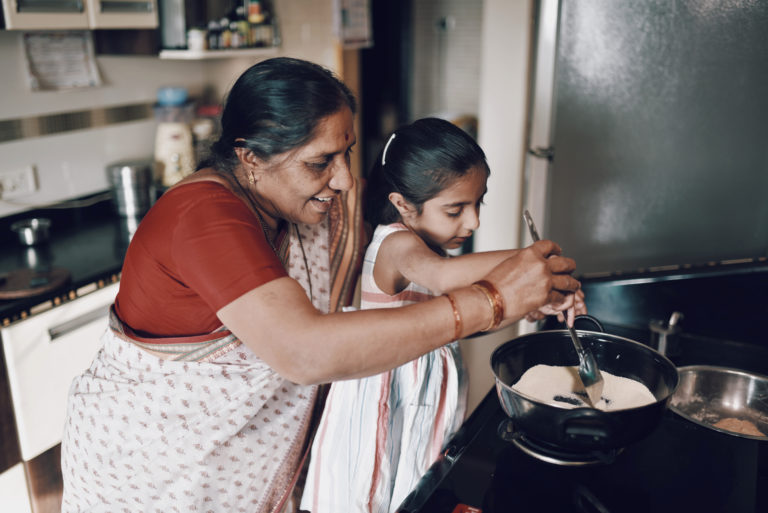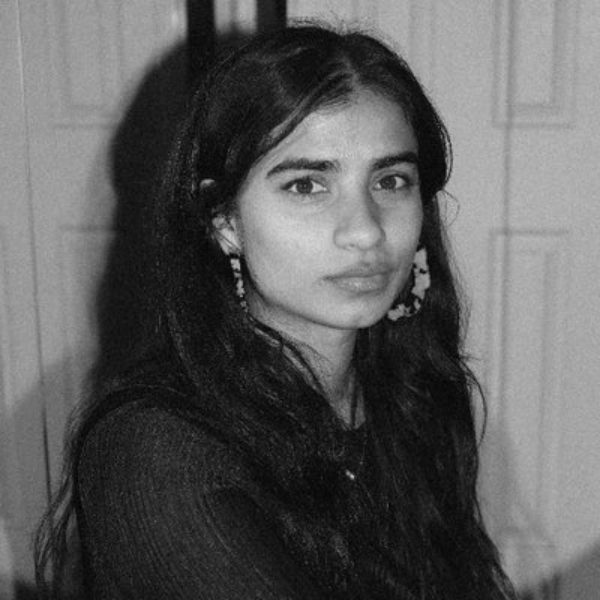
. Image by Mayur Kakade/Getty Images, © All Rights Reserved.
What Language Do We Share in Diaspora?
Inside a tight taupe leathered car, something out of a ’70s Amitabh Bachchan movie, Jesminder (Parminder Nagra), the protagonist of Bend It Like Beckham (directed by pop genius Gurinder Chadha), sits with her sister, Pinky (Archie Punjabi), on the latter’s wedding day. They’re framed by the flurry of people behind them. Pinky asks Jess, her whimsical golden churis delicately singing as she moves her hand to push a non-existent strand of hair away from her face, “Don’t you want all of this? This is the best day of your life, innit?” Her expression is uncharacteristically twee, a star of bindis lining her acute bone structure, she smiles, broadly, as if to expect a loud yes. Instead, Jess looks at her, eyebrows narrow, pointed, and says, calmly, without hesitation or the bratty intonation Pinky usually has on lockdown,
“I want more than this.”
The this is subtle, and sibilant, exaggerated like a low hum. She’s wearing a silk sari the color of dark pink roses, and it fits her beautifully — but little about the Indian wedding satiates Jess. The glamour of it doesn’t entice her, the festivities are pallid and uninspiring, leaving her disoriented and unhappy. Her dark hair is in a loose tussle, the way hair falls when it’s been primed into a neat, hair-sprayed construction. She wants more than the limits of her culture. Frozen in melancholy, she wants more than this.
Pinky falls into the category of a South Asian kid who wants what’s expected of her. She, herself, needs (and eventually has) a handsome Punjabi, Sikh husband. She wants chubby children. She craves a relatively simple life, following the trodden lead of her parents, and the community of other brown girls like her — whom she hates, but all brown aunties eventually hate other brown aunties, so it’s fine, she’s fine. She desires the script that many South Asian kids want, that of a life isomorphic to their parents’, where husbands are Indian and handsome and modern, and women can cook parathas and aloo gobi, wearing bright colored kurtas with mismatched cardigans and socks. Tried and tested equates to stability, and it’s always easier on the road more travelled. The success rate seems higher, a good return on investment.
But, what of all the rest? What of all the children who don’t fit neatly into a prescribed expectation? Children who, even when they try, clearly weren’t built for an ordinary life? Children who can’t fall into mimicry with small grace and little disappointment? Children like Jess?
*
The beauty of Jess, and perhaps one of the most relatable parts of her, is that she tries. She tries so exceptionally hard to be the good daughter that her parents have mightily intended her to be. She’s a bright kid, she respects them, listens to them, and yet despite all that, she wants more than this. She laments to Tony (Ameet Chana), her closeted Indian best friend,
“Anything I want is just not Indian enough for ‘em!”
For Jess, it’s too much to say no to the way the grass feels against her feet when she zigzags across the football field, a heap of air snaking through her T-shirt as she runs past a teammate, or the way the tight plastic ball feels at the curve of her knees when she’s moving sinuously in a game, scoring a goal. Or, when she buys her first pair of legitimate football shoes with her friend Jules, a pair of black and whites, and how they sit and laugh about it in a pub in London, giddy and innocent, unwrapping the foils of paper and plastic to unleash this small pleasure. Jess doesn’t want to lie, but she’s being confronted with herself. That itch that won’t go away.
Slowly, as so many kids like us do, Jesminder begins the dire charade of lying to her family. Football, she reconciles, is not such a bad thing. It’s the frustration of just wanting to live that becomes such a burden. She shouldn’t have to lie, but alas — she takes the leap, making the decision that every brown kid is confronted with, crossing the line that feels so shameful.
The litmus test of a good child need not be, “Do you lie to your parents?” Because the answer will always be a sweaty, “Yes.”
*
Jess represents an area of conversation still largely overlooked in South Asian communities: the child who meekly defies cultural expectation. She’s not intensely radical, she just wants to play sports, but her small act of subversion paves a road for something more. It’s why those words — I want more than this — resonated so deeply when I first watched the film in 2002. I was twelve, and I didn’t have access to myself in an honest way, mirroring myself against half fashioned heroes that looked nothing like me. I thought I needed to be anybody but myself to be validated, to be worthy of my place in this world, this brown valueless body of mine. But Jess’s slow self-actualization made me question how following another’s dream would service me. In the end, I would have to live with my decisions. So why usurp my sanity for somebody else’s dopey, unfulfilled wishes for my life?
One of the reasons we still struggle with these realities in our communities is because our language for who we are as South Asians in the West is still so young, still so undefined. We have so much internalized hatred amongst us; the running joke in Bend It Like Beckham is that Jess can marry anyone, just not a Muslim. We’ve refused to detail our shameful and horrific interlacing pasts. That the current Prime Minister of India, Narendra Modi, has been accused of participating in a cleansing of Gujrati Muslims in 2002. Or that my very own Bengali parents survived a Civil War, where three million majority Muslim Bengalis were killed by the Pakistani Army in 1971. Or that Pakistani Muslims killed Sikhs in Punjab in the ’40s, and vice versa. Or that Kashmir is still a tentative region over a debate of religion and ownership. We don’t give voice to the hatred we have for each other, and therefore we are unable to unpack the absurdity of it, when in so many ways our histories are richer, intensified, and made more glorious because of what we’ve shared through the ages.
So, we don’t have the decades of tastemakers defining and redefining what it means to be South Asian — especially what it means to be South Asian in the West. Our trauma is so intangible, so incalculable, that we’ve refused to explore it, and now we’re full of rage, feeling stuck in the strongholds of the model minority myth.
But, when a film like Bend It Like Beckham comes out, it means that for a split second we get to see what it means to be us, not an appropriative version of us; us in full definition, spilling with flaws and curiosity, with the quintessential quirks: the way the whole house smells when your mum cooks achaar, the creepy uncles who softly touch your lower back through your salwar as you sidle by, or the loudness of the communities, the way dance and song envelop us, enchanting our functions with blurry ease. There are so many pockets across the world with an Indo-centric definition, and brown kids from Brampton might have nothing in common with the brown kids in Heathrow, yet the echo of the undefined territory booms louder than our shared similarities. As does the space, the cavity, the time that we lose not exploring it.
Bend It Like Beckham is singular. In the recent years, nothing has come so close to unpacking our nuances and smudging our dearth of realities and embarrassments across a screen. We need to understand each other to understand ourselves — or, is it that we need to understand ourselves to understand each other?
*
Next to an off-white brick wall and a framed portrait of Sikh master Guru Nanak, Jess’s dad Mohaan (Anupam Kher) pours and sips a scotch. The family is tired, feet stretched along the middle table, saris lining the floor, bellies popping out to the side. Pinky’s wedding was a success, but Jess’s mother, Sukhi, didn’t know she dipped out during the wedding to play a football final, only to have a scout offer her a full scholarship to a university in California. Jess tells her mother the truth, the first time she declares her brilliance: “I played in the final today, and we won! I wasn’t going to go, but Dad let me. And it was brilliant. I played the best ever! And I was happy because I wasn’t sneaking off and lying to you. I didn’t ask to be good at football. Guru Nanak must have blessed me.”
Sukhi is furious at her husband. “You let her leave her sister’s wedding to go to a football match?!” He gets up, and paces. So rarely do we see a man wearing a turban have agency in a Western film. Mohaan is usually full of kindness, but today it’s wisdom, said through his teeth — recounting his own history of compromised self.
“When those bloody English cricket players threw me out of their club like a dog…I never complained. On the contrary, I vowed that I will never play again. Who suffered? Me. But I don’t want Jessie to suffer.”
Sukhi stays on the dusty pink couch, her face a writhing mess, lined with frustration over why she has such a difficult, un-Indian daughter. But in that moment, listening to her husband’s past, and knowing the weight of disappointment he carries, something turns. In some ways, he wanted more than this, too, but never took the chance to play it out. No parent is truly an oracle, but only blooming with blessings and fear.
In many ways, Jess’s fate was never up to her parents, and that’s what a film like Bend It Like Beckham declares. Our autonomy is important for our own stories, and sometimes you just need to see someone who looks like you, and thinks like you, to win. “I want her to fight, and I want her to win,” Mohaan says. “I don’t think anybody has the right of stopping her.”
This essay was originally published on Hazlitt. It is reprinted here with permission.

